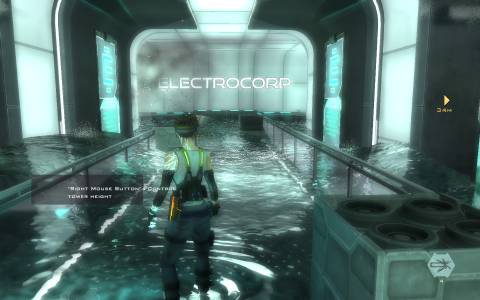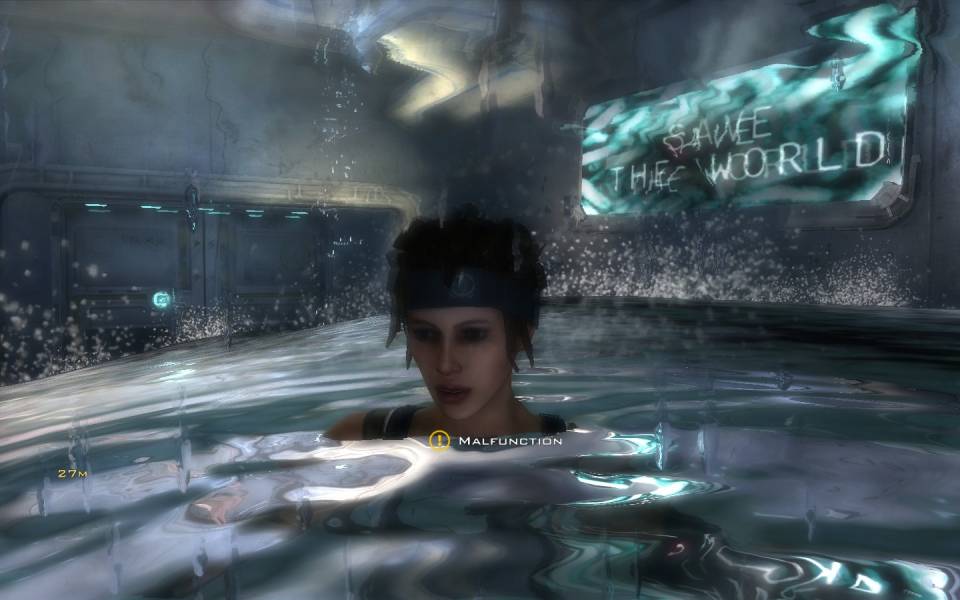If at first you don't succeed, try, try again. And again. And again. Where do you draw the line?
That's the story--so far--of Dark Energy Digital's Hydrophobia, an aquatic action game that first generated headlines for its water physics. After releasing on Xbox Live Arcade, the game courted controversy as the developers accusing reviewers of not finishing the game. Reviewers were critical of Hydrophobia, and in retrospect, Dark Energy Digital wishes it'd gone differently.
"Hindsight is a wonderful thing, isn’t it?" said senior creative designer Rob Hewson in an email. "Without a shadow of a doubt there are big things we would have done differently, but that’s the paradox of life. Sometimes you only learn the right things to do by royally cocking up (as bankers will no doubt tell you). The only thing to do is to look forwards, take what you’ve learned and do a better job next time. That more than anything is what Hydrophobia Prophecy is all about."
You'd be right to wonder why I'm talking to Dark Energy Digital about Hydrophobia, but the studio's dedication, which has sometimes involved them stepping over the line in the eyes of some, is rather remarkable. Hydrophobia Prophecy marks the original game's third release, after Hydrophobia in September and a free update dubbed Hydrophobia Pure again in December. Hydrophobia Prophecy was released earlier this month on PC through Steam, and came bundled with a crazy new feature called Darknet, which allows players to provide real-time feedback.
Before we continue, watch this video explaining what Darknet is.
Interesting, but it doesn't adequately answer why Dark Energy Digital is so committed to making Hydrophobia work. Why not move onto the next project? Haven't gamers made up their mind?
== TEASER =="I don’t necessarily agree that most gamers have made their mind up on Hydrophobia because most gamers haven’t played Hydrophobia," said Hewson. "A lot [of players] may have formed an impression of the game, but given the extreme polarisation of opinion the original game seemed to provoke, that impression will probably vary wildly depending on where they read about it."
It could have been the end of the road after Hydrophobia Pure, a 4MB update that launched alongside Listening Post, a community-focused website designed to collect feedback--good, bad and ugly. The response was so encouraging, however, that Dark Energy Digital figured more deeply incorporating feedback was worth another look. Plus, they didn't want to move on yet.
"When you work so hard for so long and you come so close to making a good game, it seems like such a waste to just drop it and move on," he said. "Having fixed the majority of major flaws with Pure, we now had a solid game with a positive critical response, but we also had all this feedback from the community."

Darknet already existed in some form internally at Dark Energy Digital for playtesting, allowing developers to track, record and categorize everything a tester does. It didn't look quite as slick as Darknet but the foundation was laid. It's one thing to play through a game and tell your friends what you think about a game on a message board, Facebook or Twitter, it's quite another to stop in the middle of gameplay and specifically flag it.
"We really weren’t expecting a big uptake at all initially," said Hewson. "We thought most people might not even notice the feature existed. However, the day after launch we switched Darknet on and the map lit up with thousands of unique pieces of feedback. The majority of feedback was actually positive. We thought people would only bother to give feedback when they were frustrated and therefore it would be mostly negative. What we’ve found is that people are more frequently saying what they love, so rather than just addressing things people dislike we’re now also focusing on making more of what they do."
It's basically effortless for the developer to add simple tweaks to the game, if we're talking about additional checkpoints, altering the locations of railings or adding more grip points for a character to grab onto. Some problems, such as preference over changed character designs, can't be as easily altered, and larger issues with the design are filed way for future games in development.
In addition to these changes improving the PC version, the feedback from Darknet will inform the PlayStation 3 version coming down the line. It's unclear whether the PS3 version will also include a form of Darknet or whether Darknet could be patched into the existing Xbox Live Arcade versions.
"We've had conversations and are continuing to have conversations," said an understandably cryptic Hewson, "but we can’t really comment on them until those conversations are complete."

I wondered whether some players took issue with even being asked to provide feedback. That's what testers are for. There could be a perception Darknet's inclusion allows incomplete games, asking the community to help push towards the finish line. It's one thing when Minecraft or SpyParty position themselves as open betas with a price tag. That's not the case here, and it's a notion Hewson pushed back on hard when asked. Instead, he views this as a natural evolution.
"We still do all the same testing and pre-release focus groups and usability studies," he said. "In fact, we actually do a lot more because [our] Data Tracker and Darknet allow us to do more pre-release anyway. All we’re saying is why does it have to stop there? Why cut and run after release? Why not let players get involved and shape the future direction of each game or series? This is the 21st century, we’re all connected, so why wouldn’t you do this? If you play a game on Facebook you can bet your behaviour and profile information is being used to improve the game and help the developer make better games in the future--why on earth would we not do the same?"